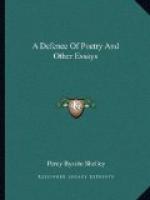An observation of the regular mode of the recurrence of harmony in the language of poetical minds, together with its relation to music, produced metre, or a certain system of traditional forms of harmony and language. Yet it is by no means essential that a poet should accommodate his language to this traditional form, so that the harmony, which is its spirit, be observed. The practice is indeed convenient and popular, and to be preferred, especially in such composition as includes much action: but every great poet must inevitably innovate upon the example of his predecessors in the exact structure of his peculiar versification. The distinction between poets and prose writers is a vulgar error. The distinction between philosophers and poets has been anticipated. Plato was essentially a poet—the truth and splendour of his imagery, and the melody of his language, are the most intense that it is possible to conceive. He rejected the measure of the epic, dramatic, and lyrical forms, because he sought to kindle a harmony in thoughts divested of shape and action, and he forbore to invent any regular plan of rhythm which would include, under determinate forms, the varied pauses of his style. Cicero sought to imitate the cadence of his periods, but with little success. Lord Bacon was a poet. [Footnote: See the Filum Labyrinthi, and the Essay on Death particularly]. His language has a sweet and majestic rhythm, which satisfies the sense, no less than the almost superhuman wisdom of his philosophy satisfies the intellect; it is a strain which distends, and then bursts the circumference of the reader’s mind, and pours itself forth together with it into the universal element with which it has perpetual sympathy. All the authors of revolutions in opinion are not only necessarily poets as they are inventors, nor even as their words unveil the permanent analogy of things by images which participate in the life of truth; but as their periods are harmonious and rhythmical, and contain in themselves the elements of verse; being the echo of the eternal music. Nor are those supreme poets, who have employed traditional forms of rhythm on account of the form and action of their subjects, less capable of perceiving and teaching the truth of things, than those who have omitted that form. Shakespeare, Dante, and Milton (to confine ourselves to modern writers) are philosophers of the very loftiest power.
A poem is the very image of life expressed in its eternal truth. There is this difference between a story and a poem, that a story is a catalogue of detached facts, which have no other connexion than time, place, circumstance, cause and effect; the other is the creation of actions according to the unchangeable forms of human nature, as existing in the mind of the Creator, which is itself the image of all other minds. The one is partial, and applies only to a definite period of time, and a certain combination of events which can never again recur; the other is




